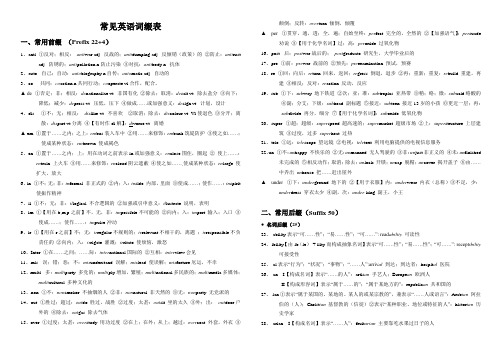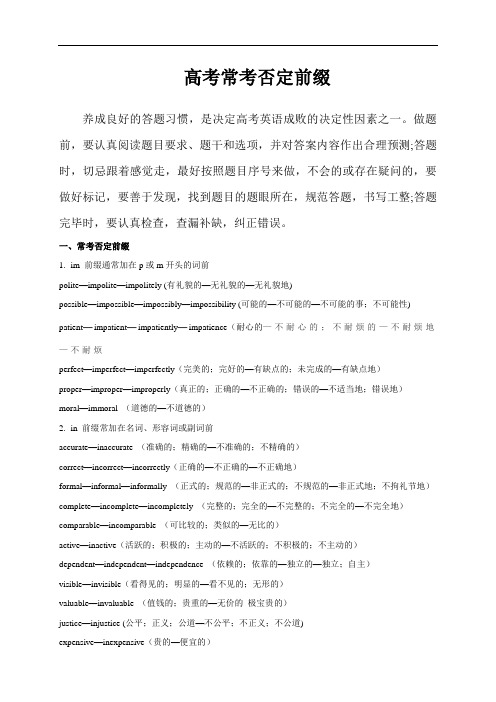高考英语常考词否定前缀和后缀
2024新高考英语复习构词法

悲伤的:sorrow—sorrowful
高雅的:grace—graceful
可耻的:shame—shameful
-less
无,不
无成效的:fruit—fruitless
无意义的:meaning—meaningless
不痛的:pain—painless
坐立不安的:rest—restless
无望的:hope—hopeless
2.形容词转换为副词
后缀 -ly
意义 以……方式
例词
绝对地:absolute—absolutely
仅仅:bare—barely
真诚地:sincere—sincerely
事实上,真实地:actual—actually
最后:eventual—eventually
很少:rare—rarely
批评性地:critical—critically
具有……特 性的;与…… 有关的
实际的:practice—practical
偶然的:accident—accidental
符合逻辑的:logic—logical
职业的:profession—professional
面部的:face—facial
金融的:finance—financial
有益的:benefit—beneficial
系统的:system—systematic 有同情心的:sympathy—sympathetic
戏剧性的:drama—dramatic
悲观的:pessimism—pessimistic
热心的:enthusiasm—enthusiastic
乐观的:optimism—optimistic
科学的:science—scientific
2023届高考英语复习常见英语词缀表清单

常见英语词缀表一、常用前缀(Prefix 22+4)1、anti- ①反对;相反:anti war adj. 反战的;anti dumping adj. 反倾销(政策)的②防止:anti rustadj. 防锈的;anti pollution n.防止污染③对抗:anti body n. 抗体2、auto- 自己;自动:auto biography n.自传;auto matic adj. 自动的3、co- 共同:co action n.共同行动;co operate vi.合作,配合。
▲ de- ①否定;非;相反:de nationalize vt. 非国有化②除去;取消:de salt vt. 除去盐分③向下;降低;减少:de press vt. 压低,压下④做成……或加强意义:de sign vt. 计划,设计4、dis- ①不;无;相反:dis like vt. 不喜欢②取消;除去:dis colour vt. Vi.使退色③分开;离散:dis part vt.分离④【有时作di解】:di vorce vt. 离婚▲ em- ①置于……之内;之上:em bus装入车中②用……来修饰:em bank筑堤防护③使之如……;使成某种状态:em brown 使成褐色5、en- ①置于……之内;上;用在动词之前表示in或加强意义:en close围住,圈起②使上……:en train 上火车③用……来修饰:en cloud阴云遮蔽④使之如……,使成某种状态:en large 使扩大,放大6、in- ①不;无;非:in formal 非正式的②内;入:in side 内部,里面③使成……;使作……:in spirit使振作精神7、il- ①不;无;非:il logical 不合逻辑的②加强或引申意义:il lustrate 说明,表明8、im- ①【用在b,m,p之前】不,无,非:im possible不可能的②向内;入:im port 输入;入口③使成……;使作……:im pulse冲动9、ir- ①【用在r之前】不;无:ir regular不规则的;ir relevant不相干的,离题;ir responsible不负责任的②向内;入:ir rigate 灌溉;ir ritate 使烦恼,激怒10、Inter- ①在……之间;……际:inter national国际的②互相:inter view会见11、mis- 误;错;恶;不:mis understand 误解;mis lead 使误解;mis forture厄运,不幸12、multi- 多:multi party 多党的;multi ply增加,繁殖;multi national多民族的;multi media多媒体;multi cultural 多种文化的13、non- ①不:non smoker 不抽烟的人②非:non natural 非天然的③无:non party 无党派的14、out- ①胜过;超过:out do 胜过,战胜②过度;太甚:out sit 坐的太久③外;出:out door户外的④除去:out gas 除去气体15、over- ①过度;太甚:over study 用功过度②在上;在外;从上;越过:over coat 外套,外衣③颠倒;反转:over turn 倾倒,倾覆▲ per- ①贯穿,通,透;全,遍;自始至终:per fect 完全的,全然的②【加强语气】:per suade 劝说③【用于化学名词】过;高:per oxide 过氧化物16、post- 后:post war战后的;post graduate 研究生,大学毕业后的17、pre- ①前:pre war 战前的②预先:pre examination 预试,预赛18、re- ①回;向后:re turn 回来,返回;re gress 倒退,退步②再;重新;重复:re build 重建,再建③相反;反对:re action 反动,反应19、sub- ①下:sub way 地下铁道②次;亚;准:sub tropics 亚热带③稍;略;微:sub acid略酸的④副;分支;下级:sub head 副标题⑤接近:sub teen 接近13岁的小孩⑥更近一层;再:sub divide 再分,细分⑦【用于化学名词】:sub oxide 低氧化物20、super- ①超;超级:super speed 超高速的;super market 超级市场②上:super structure 上层建筑③过度,过多super heat 过热21、tele- ①远:tele scope 望远镜②电视:tele text 利用电脑提供的电视信息服务22、un- ①不:un happy 不快乐的②无:un manned 无人驾驶的③非:un just非正义的④未:un finished未完成的⑤相反动作;取消;除去:un lock 开锁;un cap 脱帽;un cover 揭开盖子⑥由……中弄出un house 把……赶出屋外▲ under- ①下:under ground 地下的②【用于衣服】内:under wear 内衣(总称)③不足,少:under dress 穿衣太少④副,次:under-king 副王,小王二、常用后缀(Suffix 50)●名词后缀(25)23、-ability表示“可……性”;“易……性”;“可……”: read ability可读性24、-ibility【由-ib(le)+ ility而构成抽象名词】表示“可……性”;“易……性”;“可……”: recept ibility可接受性25、-al表示“行为”;“状况”;“事物”;“……人”:arriv al 到达;到达者;hospit al医院26、-an I【构成名词】表示“……的人”:artis an 手艺人;Europe an 欧洲人II【构成形容词】表示“属于……的”;“属于某地方的”:republic an 共和国的27、-ian ①表示“属于某国的、某地的、某人的或某宗教的”,兼表示“……人或语言”:Arab ian阿拉伯的(人);Christ ian基督教的(信徒)②表示“某种职业、地位或特征的人”:histor ian 历史学家28、-arian I【构成名词】表示“……人”:fruit arian 主要靠吃水果过日子的人II【带此后缀的名词有的可兼做形容词】表示“……的”;“……主义的”:humanitarian 人道主义者,人道主义的29、-ee ①表示“主动者”:meet ee参加会议者;return ee归来者②表示“被动者”:test ee被测试者③表示“与……有关的人(物):town ee城里人,市民;goat ee 山羊胡子30、-er I【构成名词】①表示“行为的主动者”;“做某事的人”:work er工人②表示“与某事有关的人”:weekend er度周末假者③表示“属于某国、某地区的人”:villag er村民④表示“与某事有关之物或能做某事之物”;也表示“能做某事的动物”:wash er洗衣机⑤【加在方位词后】表示“……风”:north er强北风,west er强西风(暴),south er强南风(暴),East er则表示“复活节”II【构成动词和象声动词】表示“反复动作、连续动作及拟声动作:whisp er低声、耳语III【附在一些形容词和副词之后构成比较级】表示“更……”tall er更高31、-or①表示“人”:actor 行动者,男演员②表示“物”:conductor 导体▲ -o ①表示“音乐术语或乐器名称”:sol o独唱,独奏(曲),pian o钢琴②表示“人”:Negr o黑人,politic o政客③表示“物”:studi o 工作室④表示抽象名词及其他:Mott o格言,座右铭;rati o比率,比32、-ar I【构成名词】表示“ ……人”;“……物”: begg ar乞丐,li ar说谎的人, schol ar学者II【构成形容词】表示“有……性质的”;“属于……的”、“如……的”:line ar线的,线性的;famili ar 熟知的33、-hood【构成抽象名词】表示“时期”;“情况”;“状态”;“性质”;“身份”;“资格”等:child hood童年,mother hood母性,母亲身份34、-ion ①表示“行为”;“行为的过程或结果”;“情况”;“状态”:act ion活动,作用,行为②表示“物”:cush ion坐垫,靠垫▲ -tion 【与-ion同】【构成抽象名词】表示“行为”;“行为而过程或结果”;“状态”;“情况”:atten tion 注意;introdu tion介绍,引进35、-ition ①表示“行为”;“行为的过程或结果”;“由行为而产生的事物”:compet ition比赛、竞争②表示“情况”;“状态”:aud ition听觉,听力36、-ation ①表示“行为”;“情况”;“状态”:invit ation邀请②表示“行为的过程”;“结果”;“由行为而产生的事物”:inform ation通知,消息37、-ism ①表示“……主义”:real ism 现实主义②表示“宗教”:Buddh ism佛教③表示“语言”;“语风”:American ism美国用语,London ism伦敦语调④表示“风格”;“特征”:Asiatic ism亚洲风格⑤表示“行为”;“现象”:tour ism旅游,观光⑥表示“……学,……术,……论,……法”:knownothing ism不可知论⑦(学术、文艺方面)表示“……派”modern ism现代派⑧表示“某种特性”:human ism人性⑨表示“制度”social ism社会主义,commun ism共产主义38、-ist I【构成名词】①表示“ 某种主义者或某种信仰者”:commun ist共产主义者②表示“从事某种职业的人”;“从事某种研究的人”;“与某事物有关的人”:art ist艺术家II【构成形容词】表示“……主义的”commun ist共产主义的39、-ity 【与-ty同】【构成抽象名词】表示“性质”;“情况”;“状态”等:real ity现实,真实40、-ty 【构成抽象名词】①表示“性质”;“情况”;“状态”:safe ty安全②表示“……十”:six六→six ty六十41、-ment ①表示“行为”;“行为的过程或结果”:move ment运动,移动②表示“物”:equip ment装备,设备③表示“组织”,“机构”:govern ment政府42、-ness 【加在形容词之后构成抽象名词】表示“性质”;“情况”;“状态”:good ness善行,优良43、-ology 表示“……学,……研究,……论,……法”:bi ology生物学,ge ology地质学44、-ship ①表示“性质”;“情况”;“状态”;“关系”:friend ship友谊②表示“身份”;“职位”;“资格”;“权限”:member ship成员资格③表示“技艺”;“技能”;“……法”;“……术”:horseman ship 骑马术45、-sion 【与-ion同,它所构成的名词大多由以-d,-de,-t为结尾的动词派生而来】表示“行为”;“行为的过程或结果”;“情况”;“性质”:expend→expen sion扩张,扩展;decide→deci sion决定;convert→conver sion转变,变换46、-ssion 【与-sion同,它所构成的名词大多由以-s,-ss为结尾的动词派生而来】表示“性质”;“情况”;“状态”;“关系”:posse ssion拥有,持有,具有;impre ssion印象47、-ure 【构成抽象名词】表示“行为”;“行为的结果”;“状态”;“情况”:fail ure失败▲ -ature 或-ture表示“行为”;“行为的结果及与行为有关之物“:mixture 混合,混合物;signature 签名●动词后缀(4)48、-en I【构成动词】表示“做”;“使”;“成为……”;“使变成”:dark en使黑,变黑II【构成名词】①表示“人”:citiz en公民②表示“小称”:chick en小鸡III【构成形容词】表示“由……制成的”;“含有……质的”:gold en金质的,似金的49、-ify 【与-fy同】表示“……化”;“使成为……”;“变成……”;“做……”:beaut ify美化50、-ize【与-ization相对应】表示“……化”;“照……样子做”;“按……方式处理”;“变成……状态”;“使成为……”:modern ize (使)现代化;organ ize组织51、-ise I【与-ize同,许多词具有-ise与-ize两种后缀形式】【构成动词】memer ise (=memer ize)II【构成名词】表示“性质”;“状态”:exerc ise练习●形容词后缀(17)52、-able 【附在动词、名词后构成形容词】表示“可……的”;“能……的”:know able可知的;us able能用的53、-ible 表示““可……的”;“能……的”;“易……的”;“具有某种性质的”:sens ible可感觉的54、-al 表示“属于……的”;“具有……性质的”;“如……的”:nation al国家的55、-ant I【构成形容词】【大部分与-ance或-ancy相对应】表示“属于……的”;“具有……性质的”:expect ant期待的;assist ant辅助的II【构成名词】表示“……人”;“……物”:examin ant主考人;serv ant仆人;depend ant 依附物56、-ent I【构成形容词】【与名词后缀-ence或-ency相对应】表示“具有……性质的”、“关于……的”:differ ent不同的;urg ent紧急的;innoc ent无罪的,天真的II【构成名词】①表示“……人”:stud ent学生②表示“……剂”;“……药”:deterg ent洗涤剂,清洁剂;corrig ent矫正药57、-ful I【加在名词后面】表示“充满时的量”:hand ful 一把,一把的量II【构成形容词】表示“富有……的”;“充满……的”;“具有……性质的”;“易于……的”;“可……的”:hope ful富有希望的58、-ic I【构成形容词】表示“……的”:histor ic有历史意义的II【构成名词】①表示“人”:mechan ic技工,机械师②表示“……学”;“……术”及其他抽象名词:log ic逻辑,伦理学;mus ic音乐;top ic题目59、-ical 表示“……的”:typ ical典型的60、-ish I【构成形容词】①表示“如……的”;“似……的”;“有……性质的”:fool ish愚蠢的,笨的②【加在形容词之后】表示(含有某种程度的)“略……的”;“稍……的”:old ish略老的,稍旧的③表示“某国的或某民族的”;兼表示“某国的语言”Engl ish英国的,英语II【构成动词】表示“做……”;“致使……”;“造成……”;“成为……”publ ish公布;fin ish结束61、-ive I【构成形容词】表示“有……性质的”;“有……作用的”;“有……倾向的”;“属于……的”:act ive有活力的,积极的II【构成名词】①表示“人”:nat ive本地人,土人②表示“物”:direct ive指令62、-less 【构成形容词,有时构成副词】表示“无……的”;“不……的”:home less无家可归的63、-like表示“如……的”;“有……性质的”:man like有男子气概的;war like好战的,军事的64、-ly I【构成形容词】①【加在名词后】表示“如……的”;“有……特征的”;“属于……的”:friend ly有好的②【加在时间名词之后;有的还可兼作名词】表示“每……的”;“每……时间一次的”:week ly 每周的,周报65、-ous 表示“有……性质的”;“属于……的”“有……的”;“如……的”;“多……的”:curi ous好奇的;fam ous著名的66、-ious表示“有……性质的”;“充满……的”:fur ious狂怒的,暴怒的;anx ious焦急的67、-some表示“充满……的”;“易于……的”;“产生……的”;“有……倾向的”;“具有……的”;“令……的”:dark some阴暗的;quarrel some好争吵的;trouble some令人麻烦的68、-ward 表示“向……的”:sun ward向阳的,north ward向北的69、-y I【构成形容词】①【大多加在单音节名词之后】表示“多……的”;“有……的”;“如……的”;“属于……的”:wind y有风的【注:在以y或o为结尾的词之后,拼作-ey】sky ey天空的,天蓝的II【构成名词】①【构成抽象名词】表示“性质”;“状态”;“情况”;“行为”:difficult y困难②表示“人或物”:left y用左手的人,左撇子;sweet y糖果,密钱③【在一部分词中与ie通用】表示“小称或爱称”:dadd y爸爸,爹爹●副词后缀(3)70、-ly ①【加在时间名词之后】表示“每……地”;“每……时间一次地”:week ly 每周地②【加在其他名词之后】:name ly也就是,即③【加在形容词之后】表示“……地”:new ly最新,最近71、-ward 表示“向……的”;“向……”;“朝……”:sun ward向阳的,向阳;north ward向北的,朝北72、-wards表示“向……”;“朝……”:sun wards向阳,朝阳;north wards向北,朝北。
高考英语单词常见前后缀总结

高考英语单词常见前后缀总结一:表示否定的前缀un-否定,不例子:unhappy(不开心),unfair(不公平的),unusual(不寻常的),unknown (未知的),undo(撤销)in-, im-, ir-, il-否定例子:invisible(不可见的),impossible(不可能的),irregular(不规则的),illogical(不合逻辑的),incorrect(不正确的)dis-否定,相反例子:dislike(不喜欢),disagree(不同意),dishonest(不诚实的),disconnect (断开),distrust(不信任)non-否定,不例子:nonstop(不停的),nonfiction(非虚构的),nonsense(无意义的话),nonexistent(不存在的),nonviolent(非暴力的)a-, an-无,不,非例子:amoral(无道德的),asymmetry(不对称),anarchy(无政府状态),anonymous(匿名的),anhydrous(无水的)二:表示“...之前”的前缀pre-前,预先例子:prefix(前缀),prepare(准备),prepay(预付),preview(预览),preexist(先存在)fore-前例子:forecast(预报),foresee(预见),forehead(前额),foretell(预言),forefront(最前线)三:表示“后”的前缀post-后,之后例子:postpone(推迟),postwar(战后的),postgraduate(研究生的),postscript (附言),postmortem(事后分析)四:表示“再一次”的前缀re-再,重新例子:restart(重新开始),review(复习),rebuild(重建),replay(重播),recall(召回)五:其他前缀auto-自动,自己例子:automatic(自动的),autonomy(自治),autograph(亲笔签名),autobiography(自传),autopilot(自动驾驶)bi-二,双例子:bicycle(自行车),bilingual(双语的),biweekly(双周刊),bilateral (双边的),bipolar(双极的)co-, col-, com-, con-, cor-共同例子:cooperate(合作),collaborate(合作),combine(联合),connect(连接),correlate(关联)anti-反抗,对立例子:antiwar(反战的),antibody(抗体),antiseptic(抗菌的),antithesis (对立面),anticlimax(突降)ex-, e-外,出例子:export(出口),emit(发出),exclude(排除),external(外部的),exit(出口)后缀总结一:名词后缀-ment 行为或过程例子:development(发展),management(管理),achievement(成就),agreement (协议),government(政府)-ness 状态,性质例子:happiness(幸福),darkness(黑暗),kindness(仁慈),weakness(弱点),sadness(悲伤)-ion, -tion 动作或状态例子:decision(决定),action(行动),celebration(庆祝),operation(操作),education(教育)-ance, -ence 状态,性质例子:importance(重要性),confidence(自信),existence(存在),resistance (抵抗),dependence(依赖)-ist 从事……职业的人例子:artist(艺术家),scientist(科学家),pianist(钢琴家),novelist(小说家),dentist(牙医)二:动词后缀-ize, -ise 使……化例子:realize(实现),modernize(使现代化),finalize(完成),organize(组织),utilize(利用)-en 使成为……例子:strengthen(加强),shorten(缩短),widen(加宽),broaden(拓宽),deepen(加深)-ify 使……例子:justify(证明……正当),simplify(简化),clarify(澄清),intensify (加剧),verify(核实)三:形容词后缀-able, -ible 可……的,能……的例子:readable(可读的),sensible(可感知的),manageable(可管理的),edible(可食用的),flexible(灵活的)-ful 充满……的例子:joyful(充满喜悦的),careful(小心的),hopeful(充满希望的),useful (有用的),thoughtful(体贴的)-ous, -ious 充满……的,具有……性质的例子:dangerous(危险的),curious(好奇的),famous(著名的),mysterious (神秘的),various(各种各样的)-ic, -ical ……的,属于……的例子:historic(历史的),logical(逻辑的),musical(音乐的),comic(喜剧的),scientific(科学的)-less 无……的例子:hopeless(无望的),careless(粗心的),homeless(无家可归的),fearless (无畏的),meaningless(无意义的)四:副词后缀-ly 以……方式例子:quickly(迅速地),happily(快乐地),sadly(悲伤地),easily(容易地),quietly(安静地)-ward(s) 朝向,向……例子:forward(向前),backward(向后),upward(向上),downward(向下),inward(向内)-wise 以……方式,关于……例子:clockwise(顺时针地),likewise(同样地),otherwise(否则),lengthwise (纵向地),sidewise(横向地)-ily 以……的方式例子:happily(高兴地),lazily(懒惰地),easily(轻易地),crazily(疯狂地),noisily(吵闹地)以上就是常见的英语前缀后缀。
2024届高考英语常考否定前缀学案(含答案)

高考常考否定前缀养成良好的答题习惯,是决定高考英语成败的决定性因素之一。
做题前,要认真阅读题目要求、题干和选项,并对答案内容作出合理预测;答题时,切忌跟着感觉走,最好按照题目序号来做,不会的或存在疑问的,要做好标记,要善于发现,找到题目的题眼所在,规范答题,书写工整;答题完毕时,要认真检查,查漏补缺,纠正错误。
一、常考否定前缀1. -im 前缀通常加在p或m开头的词前polite—impolite—impolitely (有礼貌的—无礼貌的—无礼貌地) possible—impossible—impossibly—impossibility (可能的—不可能的—不可能的事;不可能性) patient—impatient—impatiently—impatience(耐心的—不耐心的;不耐烦的—不耐烦地—不耐烦perfect—imperfect—imperfectly(完美的;完好的—有缺点的;未完成的—有缺点地)proper—improper—improperly(真正的;正确的—不正确的;错误的—不适当地;错误地)moral—immoral (道德的—不道德的)2. -in 前缀常加在名词、形容词或副词前accurate—inaccurate (准确的;精确的—不准确的;不精确的)correct—incorrect—incorrectly(正确的—不正确的—不正确地)formal—informal—informally (正式的;规范的—非正式的;不规范的—非正式地;不拘礼节地)complete—incomplete—incompletely (完整的;完全的—不完整的;不完全的—不完全地)comparable—incomparable (可比较的;类似的—无比的)active—inactive(活跃的;积极的;主动的—不活跃的;不积极的;不主动的)dependent—independent—independence (依赖的;依靠的—独立的—独立;自主)visible—invisible(看得见的;明显的—看不见的;无形的)valuable—invaluable (值钱的;贵重的—无价的极宝贵的)justice—injustice (公平;正义;公道—不公平;不正义;不公道)expensive—inexpensive(贵的—便宜的)experienced—inexperienced(有经验的—无经验的;不熟练的)3. -il 前缀常加在l开头的词前:legal—illegal(法律允许的;合法的—非法的;违法的)4. -ir 前缀常加在r开头的词前regular—irregular—irregularly(定期的;有规律的;经常的—不定期的;无规律的—不规则地;不定期地)responsible—irresponsible—irresponsibly(负责的;可靠的—不负责任的;不可靠的—不负责任地)replaceable—irreplaceable (可替换的;可代替的—不可替代的)5. -dis 前缀常见于形容词、动词、名词前able—disabled—disability (能够;有能力的—丧失能力的;残疾的—残疾;无能)believe—disbelieve—disbelief(相信;不信;怀疑—怀疑;不信)honest—dishonest—dishonesty(诚实的;正直的—不诚实的;不正直的—不诚实;欺诈)agree—disagree—disagreement(同意—不同意;有分歧—分歧;争论)appear—disappear—disappearance(出现;露面—消失—消失)comfort—discomfort(安慰;(使)舒服—不适;不安;使不舒服)like—dislike(喜欢—不喜欢)advantage—disadvantage(有利条件;优势;长处—不利条件;劣势;短处)courage—discourage—discouragement(勇气;胆量—使泄气;使灰心—气馁;挫折)order—disorder (顺序;条理—混乱;无序;杂乱)6. -mis 前缀常见于动词和名词前take—mistake(取;拿—犯错误;误会)understand—misunderstand—misunderstanding(理解;明白—误解;误会—误解;误会)fortune—misfortune (命运;好运;财富—厄运倒霉不幸)treatment—mistreatment(对待;处理;治疗—虐待;误治)7. -un 前缀常在形容词,副词、名词前:avoidable—unavoidable(可避免的;可回避的—不可避免的)able—unable(能干的;有能力的—不能胜任的;不能的)employed—unemployed—unemployment (被雇佣的;就业的—未被雇佣的;失业的—失业;失业人数/率)happy—unhappy—unhappily—unhappiness(高兴的;幸福的—不快乐的;不幸福的—不幸;苦恼)fortunate—unfortunate—unfortunately(幸运的;吉祥的—不幸的;令人遗憾的—不幸地;遗憾地)comfortable—uncomfortable—uncomfortably(舒服的;安逸的—感到不舒服的;令人不舒服的—不舒适地;不自在地)clear—unclear(清楚的;明白的;明显的—不清楚的;不明白的;不明显的)believable—unbelievable(可信的—不可信的;不真实的)certain—uncertain—uncertainly—uncertainty(必然的;必定的;确定的—犹豫的;不确定的—犹豫地;不确定地—犹豫;无把握)known—unknown(已知的;发现的;著名的—未知的;不出名的)friendly—unfriendly(友好的;亲切—不友好的;不利的)fair—unfair—unfairly(公平的;合理的—不公平;不合理的—不公平地;不合理地)fit—unfit(健康的;合适的—不合适的;不健康的)finished—unfinished(完成的;结束了的—未完成的)healthy—unhealthy—unhealthily(健康的—不健康的—不健康地;有病地)like—unlike—unlikely(像—不像—不可能的)important—unimportant—unimportantly—unimportance(重要的;重大的—不重要的;琐碎的—不重要地;无关紧要地—不足道;不重要)necessary—unnecessary—unnecessarily(必要的;必须的必然的—不必要的;多余的—不必要地;多余地)predictable—unpredictable(可预测的;可预料的—不可预测的;不可预料的)pleasant—unpleasant—unpleasantly(令人愉快的;惬意的—令人不快的;不舒服的—令人不快地—不讨人喜欢地)willing—unwilling—unwillingly—unwillingness(愿意的;心甘情愿的—不愿意的;不情愿的—不愿意地;不情愿地—不愿意;不情愿)true—untrue—untruth(真实的;真正的—不真实的;不正确的—虚假;不真实)usual—unusual—unusually(通常的;惯常的—不寻常的;罕见的—特别地;非常地)welcome—unwelcome (受欢迎的;令人愉快的—不受欢迎的;讨厌的)8. -non前缀stop—non-stop (停止—不停的;不间断的;直达的)smoking—non-smoking (吸烟;冒烟—不吸烟的禁止吸烟的)cooperation—noncooperation (合作—不合作)profit—nonprofit (利润;利益;好处—非营利的)nuclear—nonnuclear (原子核的—非核的)verbal—nonverbal(口头的;非书面的—非语言的)violent—nonviolent—nonviolence(暴力的;剧烈的—非暴力的;不剧烈的—非暴力)fiction—nonfiction (小说;虚构的事—非小说类作品;纪实文学)9. -ab前缀normal—abnormal (正常的;标准的;健康的—不正常的;反常的;畸形的)use—abuse(使用—虐待;滥用)二、根据汉语提示完成句子。
高考英语单词“懒人记忆法”

⾼考英语单词“懒⼈记忆法”2017⾼考英语单词“懒⼈记忆法” 学习也需要适当的取巧和偷懒,谁说⾼考英语3500词要⼀个个地记呢。
通过记前缀和后缀的“懒⼈记忆法”,⼀连⼀串。
下⾯⼩编为⼤家分享⾼考英语懒⼈记忆单词的⽅法! 前缀 ⼀、表⽰否定的前缀 1. dis- 加在名词、形容词,动词之前。
disadvantage (缺点), dishonorable(不光彩的), disagree(不同意) 2.in- 加在形容词,名词之前 incorrect(不正确的), inability(⽆能,⽆⼒), inaccurate (不准确的) 3. im- 加在字母 m,b,p 之前 impossible (不可能的), impolite (不礼貌的) 4. il- 加在以 l 开头的词前 illegal (⾮法的), illiterate (⽂盲的,⽆⽂化的), illogical (不合逻辑的) 5. ir- 加在以 r 开头的词前 irregular (不稳定的) , irresistable (不可抵抗的) , irresolvable(不能分解的,不能解决的) 6.un- 加在名词,形容词,副词之前 unfinished(未完成的), undoubted(⽆疑的), unemployment(失业) 7. non- 加在形容词,名词前 non-existence (不存在), non-essential (不主要的), non-electrical(⾮电的) 8. mis- 加在动词、名词之前 misunderstand (误解) , misjudge (误判), misleading (误导), misfortune (不幸) 9. dis- 加地动词之前 disappear(消失), disarm(解除武装), disconnect (失去联系) 10. de- 加在名词,形容词之前 decolor (脱⾊,漂⽩) 11. anti- 加在名词、形容词之前 anti-Japanese(抗⽇战争), anti-social(厌恶社会的,反社会的), antidite(解毒药) 12. counter- 加在名词、动词前 counterattack(反攻,反击), counteract(抵抗,阻碍), counterrevolution(反⾰命) ⼆、表⽰“前”的前缀 1. pre: pre-exsiting (先于……⽽存在的), pre-selection(选举前的), preface(前⾔) 2. ante: anteroom(前室,接待室), antecessor(先⾏者,先驱者) 3. fore: forehaed(前额), foreground(前景), foreman(⼯头,领班), foresee(预见,先见), foretell(预⾔) 4. pro: programme (计划), prologue(序幕) 5. ex: ex-president(前任总统), ex-wife (前妻) 三、表⽰“后”“低”“下"的前缀 post: post-war(战后), post-position(后置词) sub: sub-editor(副编辑), sub-way(地铁), sub-conscious(下意识的), submarine(海下的'), subtropical(亚热带的), subtitle(副标题) 四、其他前缀 1. re:表⽰“回”“再”“向后” retranslate (再译), reinforce (加强), reconstruct(重建), return(返回) 2. retro:表⽰“回”“再”“向后” retrograde (倒退的), retrospect(回顾) 3.co:表⽰“共同”“和” co-exist(共存), co-operate(合作), co-education(男⼥同校) 4.inter:表⽰“相互”、“之间” interchangeble (可互换的), international(国际的) 5.extra:表⽰“出”、“超出” extraordinary (⾮凡的), extramural(校外的), extrasensory(超感觉的) 6. auto- ⾃: automatic (⾃动的), autobiography(⾃传)。
期末考试高考高中最常见的语法填空变形(易错单词)精心总结

高中最常见的语法填空变形易错单词(黑体为高频错误可能的词)一、---ence, --ance,--- tion ---sion结尾(1).-ence -ance结尾的名词Exist--existence存在occur--occurrence发生refer--reference参考/指prefer-preference偏好,更喜欢differ-difference不同accept--acceptance接受appear--appearance出现perform-performance履行resist-resistance抵制guide-guidance指导enter-entrance进入insure--insurance保险important-importance重要性assist-assistance帮助disturb--disturbance打扰interfere--interference干扰,干预,Influential--influence影响,感化,violent---violence激烈,暴力,Significant--significance意义,意味。
Reliance 信赖(2)-tion -sion结尾的名词Produce--production生产introduce--introduction介绍Consume-consumption消费assume--assumption假设,认为Suppose--supposition假设,认为reduce--reduction减少Describe--description描述receive--reception接收,接待处Protect-protection保护direct--direction指导,方向,指令Instruct--instruction指令suggest--suggestion建议Construct--construction建设infect--infection注射Reject--rejection驳斥object--objection反对Edit--edition编辑exhibit--exhibition展览Connect--connection练习intend--intention打算,意图Solve--solution解决evolve--evolution进化Destroy--destruction毁灭examine--examination检查,考试Inspire--inspiration激发,灵感starve--starvation饥饿Liberate--liberation解放operate-operation操作Hesitate--hesitation犹豫invite--invitation邀请Motivate-motivation动力observe--observation观察Organize--organization组织transport--transportation交通Civilized--civilization文明realize--realization认识Recognize--recognition认出educate--education教育Prepare--preparation准备determine--determination决定,决心Expect-expectation期待form--formation形成Consider--consideration考虑inform--information通知Occupy--occupation占有distribution--distribution分发Appreciate--appreciation欣赏,感激impress--impression印象Devote--devotion投入dedicate--dedication投入Frustrate--frustration沮丧,挫败感depress--depression 沮丧Explain--explanation解释pronounce--pronunciation发音Repeat--repetition重复express--expression表达Possess--possession拥有,财产discuss--discussion讨论Explode--explosion爆炸conclude--conclusion结论Decide--decision决定divide--division分裂Confuse--confusion迷惑expand--expansion膨胀,扩大Extend--extension延伸admit--admission承认permit--permission允许二、-ment名词形式development发展,implement工具,movement动作,agreement同意,management管理,advertisement广告,establishment确立,statement声明,judgement审判,argument争论,shipment 装船,treatment对待,contentment满意,amusement娱乐,amazement惊讶argument三、-alrefuse refusal/arrive arrival/approve approval /propose proposal三、容易写错的单词1.curious(adj)---curiosity(n)2.various(adj)---variety(n)-----varieties(名词复数)---vary(v)----varies(动词三单)3.Strong(adj)---strength(n)-----strengthen(v)4.destroy(v)---destroyed(v.)---destruction(n)5.True(adj)---truly(adv)----truth(n)6.Calm/clam7.Succeed(v)---succeeded---success(n)---successful(adj)---successfully(adv)8.Refer(v)--reference(n)----referred(过去式)---referring(现在分词)9.prefer(v)---preference(n)---preferred(过分式)10.mental---metal--- medal---model---modern11.Recommend---recommendation12.write---writing---written13.Apology(n)---apologies(复数)----apologize(v)14.grammar四、形容词变副词加ly变副词的常见三种形式(大多数直接加;le结尾,把e变成y; 个别去e加ly,比如truly)(1)直接加ly,especially carefully excitedly politelymostly, recently loud-loudly clear-clearly(2)以le 结尾的形容词去e加ly构成副词Possible -possibly simple-simply comfortable-comfortably terrible-terribly suitable-suitably able-ably gentle-gently(3)以辅音字母加y结尾的单词,改y为i加lyhappy-happily heavy-heavily healthy-healthily noisy-noisily lucky-luckilyangry-angrily easy - easily(4)good - well(5)既可作形容词也可作副词的单词hard early fast high wide(6)compare(比较1):true-truly,safe-safelycompare(比较2): hard (adj/adv努力) hardly (adj几乎不)※(7)注意:有些单词有ly ,它不是副词,而是一个形容词friendly,lovely, likely, lonely,elderly,比较:动词open close形容词open (开着的)closed (关上的)opened open的过去式形式做为一个过去分词,opened有时可以做形容词性使用,如an opened door,一扇被打开的门。
高中英语2025届高考实用单词前缀汇总(否定+方向位置+程度与状态+数量关系)
高考英语实用单词前缀英语中的前缀可以从多个角度进行分类,但按照常见性和功能性,可以大致归纳为四类:否定前缀、方向位置前缀、程度与状态前缀以及数量关系前缀。
一、否定前缀否定前缀用于表达与原词相反或否定的意义。
常见的否定前缀有:non-:不,非。
【例】non-stop(不停的)non-existent(不存在的)non-alcoholic(不含酒精的)non-profit(非盈利的)non-existence(不存在)non-essential(不主要的)non-electrical(非电的)nonsense(废话)non-smoker(不吸烟者)nonprofit(非盈利的)。
dis-:不,消失掉,分开。
【例】dislike(讨厌)disobey(不服从)distract(分心)dismiss(开除)discard(丢弃)disadvantage(缺点)dishonorable(不光彩的)dishonest(不诚实的)disagree(不同意)disappear(消失)dismantle(拆除)disarm(解除武装)disconnect(失去联系)。
un-:不,无,非。
【例】unfinished(未完成的)undoubted(无疑的)unemployment(失业)unlike(不像)unfair(不公平的)unhappy(不快乐的)unhealthy(不健康的)unable(不能的)unfriendly(不友好的)。
in-, im-, il-, ir-:不,无,非,向内。
【例】injustice(不公正)invisible(看不见的)informal(非正式的)independent(独立的)incomplete(不完整的)inaccurate(不准确的)incorrect(不正确的)inactive(不活跃的)impossible(不可能的)immoral(不道德的)imperfect(不完美的)impatient(不耐烦的)impolite(不礼貌的)illegal(非法的)illiterate(文盲)irresponsible(不负责任的)irregular(不稳定的)irresistable(不可抵抗的)irresolvable(不能分解的,不能解决的)。
高中英语必备词根词缀总结
高考常见的词根词缀一、高考常见的词根1.st, sta, stan, stin , stit, stat, sist 站,立2.fer 携带,带,拿3.tend, tens, tent, ten, tain, tin, tun 伸,拉4.sit, set, sid, (h)od, sess, ceed, ced, cess 坐,走,放5.vers, vert, ward 转,弯6.vid, vis, wis, wit,view 看7.plain, plan, plat, flat, pleas, plac 平,伸展,宽8.cap(t), cept, cip, cup, ceiv, hav 抓,取9.gen, gin, gn, kin 生,产生,种类10.fac, fic, fact, fect, fit 做,放11.right, reg, rect, rich 统治,规定,正,直12.pos 放置13.circ, cur, cross 转,弯,圆,环,圈14.act, ag, ig 做,驱赶,动,行动15.sec, soc, sequ, sig(n), suit 跟随16.mod, med, me 模式,量度,医治17.two, twi, du, dou, di, bi(n) 二,两18.cap, cab,chiev, chief, chap 头19.leg, lect, lig, log 收集,说,读,选,法20.an, on, un 一21.shor(t), shir(t), skir(t), shar, scor 切割22.port 运,带,走23.spec(t), scept,scop 看,观察24.miss, mis, mit(t) , mess 送,放出,投25.dat, dit, dot 给26.ven, vent 来,去27.man, mind, ment, mon, mus, mat, math 想28.ply, plic, ploy, plex, flex, flect 编,折,叠,弯29.can, know, gn, norm, not 知道30.pend, pens 拉,伸,悬挂,称量,支付31.dic, dict, dig, teach 说,显示32.draw, drag, trac(t), treat, train 抽,拉,引,拖33.way, voy, vi, via,veh 路,运送34.part, port, par 部分,分35.cert, cret, cern 区分,确定36.pur, pour , put 切,纯净,计算,思考37.guard, ward, war, guar, gar 注意,保护38.duc, duct 引导,拉39.work, erg, org 做,工作,功40.mov, mob, mot 移动41.pac, pat, pass 步,走步,伸42.wal, vol(v), val, vel 转,滚,卷,弯43.car, char, cour, cur 跑,车44.med, mid 中间45.mon, mun 变,换,服务,公共的(e) 用,使用47.phon, ban, fam, fess 声音,说48.strong, streng, string, strict, strik, stress 拉,拉紧,压,击,打49.sun, sol 太阳,日50.cur 关心51.min, men 小52.heart , cord, cred 心53.much, mag(n), max 大54.text, techn, tect 编织,编造,造55.struct, stru, stroy 建造,堆积,展开,铺开,散开56.half, shelf, shel(l), skill, scul 切,分57.esse, sent, sence 存在58. root, rad 根,射线二、高考常见前、后缀。
41组高中高考英语拓展词根词缀派生词(PDF版)
英语常见派生词一、常见前缀1. anti- “反、抗、阻、排斥” anti-bacterial 抗菌的anti-body 抗体anti-fascist反法西斯主义者anti-gas 防毒气的anti-imperialist 反帝的anti-Japanese War 抗日战争anti-popular 反人民的anti-virus 抗病毒2. auto- “自动的、自己的” autoalarm 自动报警器autobiographer 自传autocoder 自动编码器autography亲笔签名automatically自动地automobile 汽车、机动车3. bi- “二”bi-century 两百年的bicycle 自行车bilingual 双语的bi-monthly 双月的binocular 双目的、双筒的bioxide 二氧化物4. co- “共同、一起”coauthor 合著者之一coheir 共同继承人co-operation 合作5. counter- “反、逆” counteragent 反作用剂counter-attack 反击countercharge 反诉、反告countercurrent 逆向电流counterrevoluntionist反革命分子countermarch 反向行进countermine 反水雷的水雷counterproposal 反提案counterspy 反间谍6. de- “离开、否定、减少”decentralize 分散decentre 使离开中心decompose分解decontrol 解除对...的管制decrease 减少deform 使变形degrade 使降级depress 压下、降低desalt 除去...的盐分devalue 降低价值7. dis- “否定或相反”disable 使无能disability 无能disadvantage 缺点、弱势disagree 不同意disappear 消失disapprove 不赞同disarrange 使混乱discharge 卸disclose 揭开discolor 使褪色、污染disconnect 分离discontinuous 不连续的discontinue 中止discount 折扣discourage 使泄气discover 发现diseconomy 不景气disengage 解除disfavour 不喜欢、不赞成、反感disillusion 使幻灭、醒悟disloyal 不忠诚的disobedient 不服从的disorder 混乱disorganize瓦解8. en- , em- “使……,加强”embitter 使痛苦enable 使能够enclose 包围enchain 使…… 链接encourage 使…… 有勇气endanger 使…… 危险enlarge 使…… 扩大enrich 使富裕enrobe 用…包住enslave 使…成为奴隶enthrone 加冕entrain 登上火车9. ex- “前”exceed (免除、离开)超出exception (完全)除外expense 支出expose (向外;超过) 揭露ex-soldier 退伍军人10. for-,fore- “先,前,预”forehead 前额foreman 工头、工长forward 向前11. for- “禁,弃”forbid 禁forget 忘记forgive 原谅12. hexa- “六”hexahedron 六面体hexagon 六角形、六边形13. il-, im-, in-, ir- “不、非”illegal 非法的impossible 不可能的inaccurate 不精确的inactive 不活动的inadvisable 不可取的inadaptable 不能适应的inapplicable 不适用的inartificial 非人造的、天然的inconsequent 不连贯的的inconstant 不稳定的inconvenient 不方便的incredible 难以置信incurable 治不好的incurious 不好奇的independent 独立的indignity 无礼、污辱ineffective 无效的inexistence 不存在inexpert 不熟练的inextensible不能伸展的infertile 不肥沃的informal 非正式的infrequent很少发生的injustice 非正义的invisible 看不见的irregular 不规则的irremovable不能移动的irrespective 不考虑、不顾irresponsible 不承担责任的14. inter- “相互、之间”interchange 交换intercommunication 相互交流interconnect 使相互联系international 国际的internet 互联网interpose 插入15. macro- (大),micro- “微、小”macroclimate 大气候microscope 显微镜产品microclimate 小气候microphone 麦克风16. mid- “中、半”midday 中午midnight 半夜midterm 期中的17. mini- “微小的” minibus 中客车、面包车minicab 微型出租车minicam 微型摄像机minicomputer 微机minimize 使缩到最小minimum 最小量minipark 小公园miniskirt 超短裙、迷你裙18. mis- “坏、错、误” misapply 误用、滥用misbecome 不适合于misbehave 使行为不当misbehavior 不正当行为misbelief 错误的信仰misbirth 流产、堕胎miscalculate 算错、估错miscarry (信件)送错misconduct 办错、对…处理不当misdate 写错日期misdeed 不端行为、罪行misdirect 指错方向misdoing 坏事、恶行miseducation 错误教育misfortune 不幸、灾祸misguide 误导、误入岐途misinterpret 曲解、译错mislead 错导mislike 嫌、厌恶mismatch (婚姻)错配misname 叫错名misplace 放错地方misread 读错mistake 错解mistime 使不合时宜mistrust 不信任misunderstand 误解misuse 误用19. multi- “多” multiform 多形式的multilingual 多语言的multimedia 多媒体multi-national 多民族的multipolar 多极的multipurpose 多种用途的20. non-,“非、不”nonmetal 非金属noncooperation 不合作noneffective 无效的、无战斗力的nonessential 不重要的nonexistence 不存在noninvolvement 不干涉nonlogical 不合逻辑的non-mechanized 非机械化的nonnatural非天然的、违背自然的nonpayment 不支付nonperformance 不履行、不实行21. over- “过分、过度、外”overact 做得过分overage 过老的overall 包括一切的overbalance 使失去平衡overblow 吹散overbuild 过多建筑overbusy 太忙的overcareful 过分小心的overcoat 大衣、外衣overcome 克服overcritical 批评过多的overcrop 过度耕作而使土地贫瘠overcrowd 使拥挤overdevelop 过度发展overdo 把…... 做得过头overdose 给(药)过量overdrive 驱使过度overeat 使吃得过多overemphasize 过分强调overextend 使过分延长overfill 把…... 装得过满overfulfill 超额完成overfull 太满的overgrow 种得过多、长得过快overhang 悬于…... 之上overheat 使过热overlay 在...上铺盖overload 使超载overlong 太长的overlook 眺望、检查overman 使超编overproduce 生产过剩overproduction 生产过剩overreach 超越overreact 反应过度overrun 使跑得快oversea 在海外oversee 鸟瞰、检查oversell 卖得过多overwork 过度操劳22. pre- “先、前、预先”prewar 战前prehistoric 史前的prepay 预付precondition 先决条件23. re- “重、再、复”rewrite 重写return 返回review 复习recycle 再循环reuse 再利用redo 再做、重做reread 重读24. sub- “附属的、次级的、亚的”subhead 小标题subway 地铁subcommittee 小组委员会submarine 潜艇subsoil 下层土subeditor 副编辑、审稿员subhuman 低于人类的subsonic 来音速的25. tele- “远程的”telephone 电话television 电视telescope 望远镜telecommunication远程通信26. tri- “三”、“三次”、“三倍”triangle 三角形tricycle 三轮车triplane 三翼飞杨trisect 把裁成三断tribasic acid 三元酸27. ultra- “过极的”,“极端的”ultra-left 极"左"的ultra-leftist 极左分子ultra-right 极右的ultrashort 极短的ultrathin 极瘦的ultra-conservation 过于保守的ultra-democracy 极端民主的ultrafashionable 极其流行的ultramodern 极其现代化的ultranationism 极端民族主义ultrarapid 超速的28. un- “不”,构成形容词或动词unable 不能的unacceptable 不能接受的unaffected 未受影响的unadaptable 不能适应的unadmitted 不让进入的unadopted 未采用的unadvisable 不适当的unallowable 不能允许的unapproved 未经同意的unartificial 非人工的、自然的unassisted 无助的unavailable 无法利用的unawakened 未醒的、潜伏的unaware 不知道的unbalance 使不平衡unbelief 不信unbend 弄直unbreakable 不易破碎的unbroken 未破损的、完整的unbuild 拆毁uncertain 不确信的unchangeable 不变的unclose 打开uncritical 不加批判的uncultured 未受教育的uncomfortable 不舒服的uncover 暴露undated 未注明日期的undecided 未决定的unemployed 未受雇佣的、失业的undetermined 未确定的undeveloped 未开发的、不发达的undiscovered 未被发现的undivided 未分开的undress 使脱衣服uneasy 心神不安的unearth 发掘uneconomical 不节俭的unfold 展开unhealthy 不健康的unimportant 不重要的unkind 不和善的unlock 开启(锁)unnecessary多余的unpack 打开(包裹等)unpleasant 不高兴的untie 解开、松开(绳索等)29. 前缀under-(1) 用在动词前,“过低,不足”undercapitalize 投资不足underdo 不尽全力做underdevelop 发展不足underdrain 暗渠排水undergo 经历underload 欠载underman 使人员配备不足under-nourished 营养不足的underpaid 少付...工资underreport 少报、低估(2). 用在名词前,“在…下面的、较低的,内”underage 未成年的underclerk下级职员,助理办事员underclothes 内衣undercurrent 潜流underdrainage 地下排水underemployment 就业不足的undergardener 助理花工undergarments (一件)内衣undergraduate 研究生underground 地下的undergrowth 发育不全underline 在...下划线underpass 地道underpants 内裤underpopulation 人口稀少underproduction 生产不足undersea 海底的undersecretary 助理秘书underskirt 衬裙30. 前缀vice-,“副、次”、“代理”vice-chairman 副主席vice-governor 副州长vice-premier 副总理vice-president 副总统二、常见后缀1 -able “有…… 可能的、可以…… 的”,构成形容词:acceptable 可以接受的、合意的accessible 容易接近的、得到的adjustable 可调整的、可调节的admirable 令人钦佩、值得敬仰的avoidable 可避免的unbelievable难以置信的comfortable 舒适的、感到安慰的comparable 可以相比considerable 值得考虑的downloadable 可下载的endurable 可忍的、能持久的expellable 可驱逐的、应开除的honorable 荣誉的、光荣的incredible 难以令人置信的miserable 悲惨的、可怜的navigable 可航的reasonable 合情合理的respectable 可敬的responsible 有责任的、负责的sustainable 能持续的、能维持的terrible 可怕的、恐怖的、骇人的unthinkable 不可思议的valuable 值钱的、贵重的visible 看得见的、可视的2 –age “身份”,构成抽象名词disadvantage 劣势、弱点marriage 婚姻pupilage 学生身份passage 段落、文章percentage 百分数、百分率shortage 缺少storage 贮藏、保管teenage 少年的3 al- 构成抽象名词arrival 到达withdrawal 收回refusal 拒绝approval 批准、认可survival 生存revival 苏醒、复活dismissal 打发、免职proposal 提议removal 移动、调动revival (对旧时事物的兴趣)恢复terminal 终端trial 试、试用、审判4 –al 构成形容词economical 节省的、节俭的electrical 电的elemental 基本的emotional激动的environmental 环境的ethical 伦理的grammatical 语法的memorial 记忆的medical 医学的maternal 母亲的、母方的mental 精神的、脑力的municipal都市的、市政/市立的musical 音乐的national 民族的natural 自然界的occasional偶然的、特殊场合的official 官员的oriental 严厉的、冷酷的、残忍的original 起初的、原始的、独创的operational 操作的、运作的paternal 父亲的、父方的penal 刑事的、刑法的periodical 周期性的、定期的personal 个人的political 政治的practical 切实际的professional 专业的、职业的psychological 心理的recreational 娱乐的、休养的rural 乡下的、田园的、乡味的spiritual 精神神上的social 社会的technical 拔术的tidal 潮汐的traditional 传统的universal通用的/普遍的、世界的vegetal 植物的、植物性的5 –an, -ian “人、……职业者”,构成名词American 美国人electrician电学家Italian 意大利人Iranian 伊朗人librarian 图书馆管理员magician 魔术师、巫师mathematician 数学家musician 音乐家Palestinian 巴勒斯坦人的politician 政治家Russian 俄国人statistician 统计学家technician 技术员、技师vegetarian 素食的、素食者6 –ant / -ent,构成形容词distant 遥远的important 重要的silent 安静的patient 耐心的absent 迟到的different 不同的convenient 方便的excellent 优秀的intelligent 聪明的、有才智的negligent 疏忽的obedient 服从的permanent 永久的resistant 反抗的respondent 被告servant 仆人tyrant 暴君urgent 紧急的、急迫的subsequent 随后的、随继的violent 暴力的militant 好战的7 -ance,-ence 构成动作名词或抽象名词acceptance 接受appearance 外表allowance 允许assistance 援助、帮助attendance 出席avoidance 避免consequence 后果、结果convenience 方便correspondence 通讯dependence 依靠disturbance 打扰difference 不同emergence 紧急情况entrance 进口existence 存在presence 出现performance 表演、执行ignorance 无知influence 影响interference 干扰intelligence 聪明emergence 出现permanence 永久的performance 執行presence 出现endurance 忍耐、耐劳absence 不在resemblance 相似(之处)resistance 坚持fluence 流利evidence 明显、证据diligence 勤奋distance 距离disturbance 打扰guidance 指引inference 推论innocence 清白、无罪intendance 监督、管理negligence 疏忽、粗心大意permanence 永久性、持久性obedience 顺从、服从occurrence 发生、出现precedence 领先、在前preference 偏爱offence 触怒、冒犯significance 重要性subsequence 随后、后来violence 暴力8 -dom 构成名词kingdom 王国freedom 自由9 -ed 构成形容词amused 有趣的是astonished 令人惊讶的blessed 神圣的、受惠的bored 无聊的、无趣的、烦人的complicated 复杂的disappointed 令人人失望的delighted 令人高兴的excited 兴奋的、激昂的experienced 有经验的faded 褪色的learned 博学的related 相关的skilled 熟练的united 联合的、统一的10 -ee,-eer,-er,-or,构成表人的名词announcer 宣布者、广播员beginner 初学者builder 建设者calculator 计算器/机circulator 传播人、循环器competitor 竟争人、对手conductor 导体、售票员director 指导者、导演employee 被雇佣者engineer 工程师examinee 受试人indicator 指示者interviewee 被采访者milker 挤奶人nominee 被提名者passer 过路客placer 放置者rubber 按摩师runner 经营者、赛跑人singer 歌手teller 讲述人tailor 裁缝trainer 训练人thinker 思考人visitor 指导者、理事、导演volunteer 志原者waiter 服务生writer 作者、写手11 -en,形容词后的-en构成及物动词;名词后的-en 构成形容词brighten 使发亮deepen 使…加深flatten 把...弄平frighten 使惊恐harden 使变硬heighten 提高lengthen 延长loosen 放松ripen 使成熟sharpen 削尖soften 弄软shorten 缩短stiffen 变疆硬strengthen 使…加强、加强thicken 加厚threaten 威胁tighten 使变紧weaken 减弱widen 使…加宽worsen 使…更糟wooden 木的woolen 羊毛的12 -ess 构成表“雌性”的名词actress 女演员goddess 女神hostess 女主人stewardess 女乘务员waitress 侍者13 -free “免…… 的、无……的”,构成形容词gravity-free 无重力的、无引力的water-free 不漏水的tax-free 免税的ice-free 不冻的interest-free无息的14 -ful “满”,构成形容词beautiful 漂亮的merciful 仁慈的careful 小心的、谨慎的doubtful 怀疑的、疑惑的dreadful 可怕的、令人敬畏的faithful 守信的fateful 命中注定的fearful 可怕的forgetful 健忘的frightful 可怕的、讨厌的helpful 有助的hopeful 充满希望的regretful 悔恨的resourceful 资源丰富的respectful 恭敬的skillful 熟练的sorrowful 悲伤的successful成功的tearful 含泪的wonderful 精彩的15 -ful 构成表“容量单位”名词a armful of … 一抱basketful 一满篮bucketful 满桶handful 一把mouthful 满口spoonful 一匙(的量)16 -hood 构成抽象名词childhood 童年、早期falsehood 谬误、谎言livelihood生活、生计priesthood 传教士(身份)17 –ic 构成形容词automatic 自动的basic 基本的characteristic 特征的classic 最优秀的、一流的economic 经济的enthusiastic 热情的electric 电的、导电的energetic 精力充沛的gymnastic 体操的、体育的heroic 英勇的historic 有历史意义的magic 魔法、魔术的(只作定语)materialistic 唯物主义的organic 有机体的patriotic 爱国的、有爱国热情的simplistic 过于简化的symbolic 象征性的systematic 系统的、体系的18 -ice “性质”,构成名词justice 公正notice 通知19 -ics 构成学科名词gymnastics 体育、体操physics 物理学politics 政治学mathematics 算术、数学20 –ing 构成名词或形容词amusing 逗笑的astonishing 惊讶的blessing 幸事、赐福boring 令人厌烦的boxing 装箱、拳击flaming 燃烧的greeting 问候misunderstanding误会promising 有前途的remaining 剩余物satisfying 令人满意的suffering 痛苦、苦难training 训练21 -ish 构成形容词feverish 发烧的、热病的foolish 傻的Swedish 瑞典的Spanish 西班牙的22 -ism “ …… 主义”构成名词Buddhism 佛教communism 共产主义escapism 逃避现实extremism 极端主义hegemonism 霸权主义imperialism 帝国主义patriotism 爱国主义protectionism 保护主义socialism 社会主义terrorism 恐怖主义tourism 旅游业23 -ist “ …… 主义者、从事……职业者”,构成名词archaeologist 考古学家bioiogist 生物学家botanist 植物学家chemist 化学家communist 共产主义者colonist 殖民地居民、殖民者copyist 抄写员economist 经济学家extremist 极端主义分子geologist 地质学家imperialist 帝国主义者physicist 物理学家psychologist 心理学者receptionist 接待员specialist 专家sociologist 社会学家scientist 科学家terrorist 恐怖分子typist 打字员tourist 旅游者zoologist 动物学家24 –ive构成否定形容词active 活泼的aggressive 冒犯的、侵略的attractive 吸引人的、有魅力的comparative比较的、相对的compensative 弥补的conservative保存/防腐的、保守的defensive 防御的definitive 决定的、确定的effective 有效的、生效的indicative 象征的、预示的instructive 有教育意义的interruptive 中断的、阻碍的massive 巨大的offensive 唐突的、冒犯的oppressive 残酷的、压迫的originative 有创造力的persuasive 有说服力的predictive 预言性的、预兆的productive 生产的progressive 进步的、向前进的protective 防护的relative 有关系的representative 代表的restorative 滋补的restrictive 限制的、约束的suggestive 暗示的、示意的terminative 终止的、结束的25 –ize构成及物动词actualize 实现、使现实化analyse 分析apologize 道歉、辩白categorize 分类colonize 殖民于organize 组织realize 实现26 –less构成否定形容词cordless 无绳的careless 粗心的hopeless 无望的doubtless 无疑的helpless 无助的restless 还安的rustless 无锈的、不锈的27 –let “小东西” 构成名词armlet 臂环anklet 脚镣booklet 小册子bracelet 手铐hamlet 村庄leaflet 传单28 -ly 构成的形容词brotherly 兄弟般的costly 昂贵的daily 日常的friendly 友好的lively 活泼的lonely 孤独的lovely 可爱的monthly 每月的orderly 整洁的quarterly 每四分之一的weekly 每周的yearly 每年的29 -ly构成的副词accurately 精确地annually 年度性的apparently明显地basically基本地bitterly 痛苦地clearly 清澈地coldly冰冷地constantly不断的、经常的coolly 凉快地effectively 有效地ethically 合乎道德地exactly 精确地factually 事实上fairly 相当的fearfully 可怕地fiercely 凶猛地finally 最终地financially 节省地forgetfully 健忘地frequently 频繁地generally 一般地gratefully 感激地habitually 习以为常地happily 幸福地hopefully 充满希望地indirectly 间接地initially 最初的jokingly 开玩笑地largely 大量地laughingly 带着笑地mercifully 仁慈地naturally 自然地orally 口头地particularly 特别地personally 亲自地properly 恰当地permanently 永久地possibly 可能地potentially 潜在地practically 实际上primarily 起初rarely 很少really 真正地recently 最近relatively 相对地roughly 粗糙地severely 严严地similarly 相似地simply 间单地singularly 单独地slightly 轻微地smartly剧烈地smilingly 微笑地specially 特别地steadily 稳定地steadily 稳固地steeply 陡峭地successfully 成功地surprisingly 惊奇地swiftly 疾速地thickly 厚实地thinly 稀薄地tightly紧迫地totally 统统地、总共地truly 真正地understandingly 有理解力地usefully 有用地usually 通常地uselessly无用地utterly 彻底地、绝对地30 -ment 构成抽象名词adjustment 调整advertisement 广告agreement 协议amusement 娱乐、消谴announcement 宣布appointment 约定argument 争论arrangement 安排astonishment 惊讶attachment 连接、附件confinement 限制development 发展disillusionment 醒悟、幻灭disappointment 失望embarrassment 窘迫equipment 装备establishment 建立、设立excitement 兴奋government 政府improvement 改进、改良judgment 判断lodgment 住宿movement 运动pavement 人行道reinforcement 增援、支援requirement 需要settlement 定居点supplement 增补、补充--treatment 待遇31 -ness 构成抽象名词bitterness 苦carelessness粗心clearness清楚coolness凉爽correctness正确dampness潮湿darkness黑暗dullness阴沉directness直接eagerness 渴望、热切effectiveness 有效exactness 精确flatness 平坦forgetfulness 健忘heaviness 重kindness 慈祥nervousness 紧张permanentness 永久性quickness 迅速roughness 粗糙sadness 难过shallowness 浅sharpness 锐利shortness 短slowness 慢smartness 精明steadiness 稳定性usefulness 实用32 –ous 或-ious 构成形容词adventurous 冒险ambitious 有雄心的、野心勃勃的cautious 小心的、谨慎的conscious 有意识的、有知觉的continuous 继续的desirous 渴望的envious 忌妒的、猜忌的humorous 幽默的、诙谐的industrious 勤奋的infectious 传染的、有坏影响的mountainous 多山的、山区的mysterious 神秘的nervous 神经的、易激动的nutritious 有营养的poisonous有毒的prosperous 兴旺的、繁荣的rebellious 造反的、反抗的religious 宗教的repetitious 重复的、反复的tyrannous 暴政的、专横的various 各样的、多种多样的33 -port 构成名词passport 通行证airport 机场seaport 海港34 –ship 表示性质、职业、份、技能等,构成抽象名词citizenship 公民身份friendship 友谊leadership 领导marksmanship 射击术professorship 教授职位scholarship 学者sportsmanship 体育道德35 -sion 构成抽象名词admission 允许、承认、首肯aggression 侵略collision 碰撞comparison 比较conclusion 结论、结束confession 承认confusion 混乱conversion 变换、转化diversion 转向、转移emission 散发、发射erosion 腐蚀expansion 张开、伸展expression 词组、表达式invasion 入侵、侵略omission 省略、遗漏oppression 压迫、压制permission 允许procession 行列、队伍profession 职业、专业revision 修正、复习tension 拉紧、紧张36 -th 构成抽象名词birth 生育、出生depth 深度length 长度strength 力量warmth 温暖width 宽度youth 青春37 -tion构成动作名词或抽象名词actualization 实行、使现实化addiction 增加、增加物administration 管理、经营admiration 钦佩、赞美application 请求、应用、运用appreciation 欣赏、鉴赏calculation 计算celebration 庆祝、典礼circulation 循环、环流classification 分类、类别combination 结合compensation 补尝、酬报competition 比赛complication 复杂、混乱concentration 集中、专心conduction 传导congratulation 祝贺conservation 保存、保护consideration 考虑、思考consolidation 巩固、加强construction 建造、建筑consumption 消耗、消费continuation连续、继续contradiction 矛盾creation 创造cultivation 耕种、开发definition 解脱、定义declaration 宣布、宣告declination 倾斜、衰微description 描写描述digestion 消化edition 版本education 教育estimation 估计、估算exhibition 展览expectation 预期、期待explanation 解释exploration 探索extinction 熄灭evaluation 演变examination 检查、细查graduation 毕业illustration 说明、图解imitation 模仿、仿造imposition 负担、强加infection 传染、侵染inflation 充气、膨胀indication 指示、指出initiation 开始、创始inspection 检查、审查inspiration 鼓舞、激励installation 安装inscription 铭文、碑文insulation 孤立interruption 中断、遮断introduction 介绍、引进investigation 调查irrigation 灌溉invitation 邀请modernization 现代化narration 叙述navigation 航行nomination 提名nutrition 营养、营养物operation 操作、运转organization 组织--origination 源于、创始、发明participation 参与、参加preparation 准备preservation 保存、保管prevention预防、防止promotion 促进pronunciation 发音purification 纯化、净化quotation 引语、语录reception 接待、接见recognition 认出、识别recommendation 推荐recreation 娱乐、消遣reflection 反映、倒影repetition 重复、反复representation 代表reformation 改革、革新restoration 回复、恢复revelation 展现、显露revolution 革命sanitation 环境卫生satisfaction 满意simplification 简化stimulation 刺激、兴奋starvation 饥饿termination 结束、结局translation 翻译transportation 交通unification 统一、联合38 –ure构成抽象名词failure 失败architecture 建筑学mixture 混合物39 -ward(s) 构成方位副词upwards 向上downwards 向下eastwards 向东northwards 向北southwards 向南westwards向西forwards 向前backwards 向后towards 向、朝40 -y 构成的形容词或名词bloody 有血的、血淋淋的bravery 勇敢的cloudy 多云的cruelty 残酷difficulty 困难foggy 多雾的funny 滑稽可笑的greedy 贪婪的handy 手边的healthy 健康的honesty 诚实hungry 饥饿的icy 冰凉的imaginary 想像出来的legendary 传奇文学、传奇故事书literary 文学的loyalty 忠诚misery 悲惨、痛苦modesty 谦虚mystery 神话、神秘的事/人necessity 必要性、必需品nursery 托儿所penalty 处罚、罚款piracy 盗版poetry 诗歌pregnancy 怀孕rainy 多雨的recovery 重获、复得revolutionary 革命rusty 生锈的、恼火的safety 安全salty 咸的scenery 风景、景色shady多荫的slavery 奴隶制smoky 冒烟的starry 布满星星的steady 稳固的、稳定的supplementary 补充的、增补的technology 技术、工艺thirsty 口渴的trendy 随潮流的、时髦的urgency 紧急、迫切variety 变化、多样性、品种wealthy 富有的weary 疲倦的、厌倦的windy 多风的wizardry 巫术41 以-ity音节结尾,构成抽象名词,表性质状态ability 能力accessibility易接近acidity 酸味activity 活动adaptability 适应性adversity 逆镜availability 可用性captivity 束缚、监禁complexity 复杂性conductivity 传导性creativity 创造力curiosity 好奇心electricity 电equality 平等extensibility 可延展性extremity 末端、终极facility 设备generosity 慷慨、大方hostility 敌意、敌视identity 识别、鉴定inferiority 下等、劣等intensity 强度majority 多数maturity 成熟、有经验mentality 智力、精神、心态minority 少数nationality 民族personality 个性possibility 可能性potentiality 潜力predictability 可预报性productivity 生产率prosperity 繁荣、兴旺relativity 相关性reliability 可靠性responsibility 责任security 安全、安全感simplicity 简单、简易society 社会stability 稳定性stupidity 愚蠢superiority优势、优越tensity 紧张、紧张度universality 普遍性、一般性visibility 能见度。
高考英语单词词根前缀后缀
背单词常用字根?前缀+词根+后缀?词根(词根可以单独构成词,也可以彼此组合成词)1?ag=do,act?做,动agent?代理人2?ann,?enn=year?年annual?每年的,年度的3?audi,?audit=hear?听audible?听得见的4?bell=war?战rebellion?反叛,反抗5?brev=short?短abbreviate?缩短,节略6?cas=down?落下occasion?发生;时机7?cand=bright?白,光candle?蜡烛8?ced,ceed=go?行走precedent?先行的,在前9 cept=take?拿,取exception?例外,除外10?cert,?cern=clear?搞清,区别certify?证明;保证?奇速英语?乐中学11?celer=fast?快,速celerity?迅速,敏捷12?cid,?cis=cut,?kill?切,杀suicide?自杀13 circ=ring?环,,圆circle?圆,圈,环状物14?claim,?clam=cry,?shout?喊叫exclaim呼喊,惊叫15?clar=clear?清楚的,明白的clarify?澄清;使16 clud,?clus=close,?shut?关闭exclude排斥,拒绝,接纳17?cogn=know?知道cognition?认知18 ord=heart?心cordial?衷心的,诚心的19?corpor,?cor=body?体corporation?团体,社团20?cred=?trust?相信,信任credibility?可信,可靠21 cret,?creet=depart?区别discrete?分立的22?cruc=cross?十字crucify?把……钉在十字桇上;折磨23 cur=care?关心,挂念,注意security?安全24?cru,?curs,?cour,?cours=run?跑cruise?巡航舰25?dict,dic=say?言,说dictator?独裁者,口授者26 dit=give?给edit?编辑27don?=?give?给donor?赠与者28?du?=?two?二dual?双的29?duc,duct=lead?引导conduct?引导,指导,经营30?equ?=?equal?等,均,平equal?相等的,平等的31 fact,?fac=do,?make?做,作factory?工厂32 fer=bring,?carry?带,拿different?不同的,相异的33?flor,?olour=flower?花florid?如花的,华丽的34?flu=flow?流fluency?流利,流畅35 fus=pour?灌,流,倾泻refuse?拒绝,拒受36?grad=step,?go,?grade?步,走,级gradual?逐步的37?gram=write?写telegram?电报graph=write,?writing?写,画photograph?照相,拍照38?gress=go,?walk?行走progress?进步39?habit=?dwell?居住cohabit?同居40?hibit=hold?拿,持exhibit?展出,展览41?hospit,?hosp=guest?客人hospitable?好客的42?it=go?行走exit?出口,退出43?leg=lect?说legend?传说44?ject=throw?投掷projection?投掷,发射45?lect,?leg,?lig=choose,gather?选,收elect?选举46?lev=raise?举、升elevate?抬起,使升高47?liber=libert?y?自由liberation?解放48?liter=letter?文字,字母literate?识字的,有文化的49?loc=place?地方local?当地的50?log=speak?言,说dialogue?对话51?man=?dwell?居住mansion?宅邸,大厦52?man,main=sta?y?停留remain?留下,逗留53 manu,?man=hand?手manuscript?手稿54?mar=sea?海marine?海上的,航海的5 medi=middle?中间mediate?居中调解,调停56?memor=memory,mindful?记忆,记住的memory?记忆,记忆力57?merg,mers=?sink?沉emerge?浮现,出现58?migr=?move?迁移migrate?迁移,移居60?mini=small,less?小minimum?最小数61?mir=wonder?惊奇,惊异admire?赞赏,钦佩62?mit=?send?送transmit?传送63?mot,mob=move?移动motion?运动,动64?mort=death?死mortal?终有一死的65?nov=new?新novel?新的,新奇的66?numer=number?数numeral?数字,l?6767 oper=work?工作operation?手术,工作,操作68?ori=rise?升起orient?东方,东方的69?paci=peace?和平pacify?使和平,抚慰70?pel=push,drive?推,逐驱propel?推动71?pend,?pens=hang?悬挂pendent?悬空的,悬而未决的72?pet=seek?追求compete?竞争,比赛73?phon=sound?声音phone?电话74?pict?=?paint?画,描绘picture?绘画,图片75?plic?=?fold?折,重叠explicate?解释,说明76?pon=put?放置postpone?推后,推迟77?port=carry?拿,带,运import?输入,进口78?pose=put?放置position?位置态度79 preci=price?价值precious?宝贵的珍贵的80?rect=right,?straight?正,直correct?改正,纠正81?rupt=break?破rupture?破裂,使裂开82scend?=?climb?爬,攀行transcend?超出,超越83?sci=know?知science?科学84?sec,sequ=follow?跟随sequence?继续,连续85?sent,?sens=feel?感觉sentiment感情,思想感情86?sid?=?sit?坐preside?主持,指挥87?sist,ist?=?stand?立assist?帮助,援助88?spect=look?看spectate?出席,观看89?spir=breathe?呼吸inspire?鼓舞,吸入90?tain,?ten=hold?握,持,守contain?容纳,包含,内装91?tect=cover?掩盖detect?侦查,发觉92?tempor=time?时temporary?暂时的,临时93 tend,?tens=draw?拉tension拉紧,引力94?tent,?tract=draw?拉,抽,引tractor?拖拉机95?un,?uni?=?one?一unify?统一,使成一体96?vac,?vacu=empty?空vacancy?空白,空虚97 vad,?vas=walk,go?行走invasion?入侵,侵略98 ven=come?来convene?召集(会议),集会99?vert,?vers=turn?转subvert?推翻,颠覆100?vis,?vid=see?看visible?可见的,看得见的前缀(前缀改变单词词义)一.表示否定的前缀1.dis-加在名词、形容词,动词之前。
